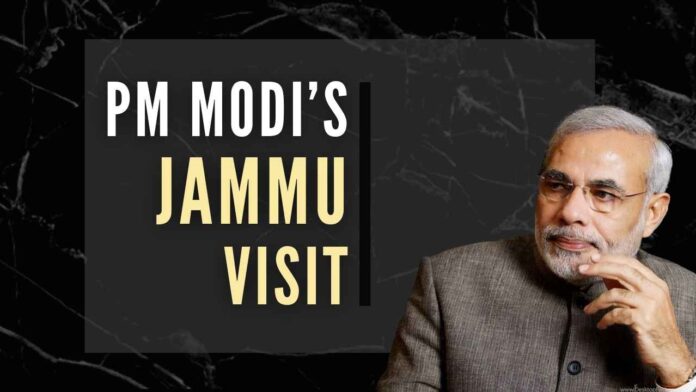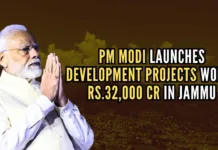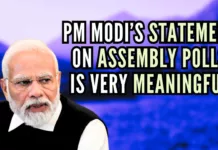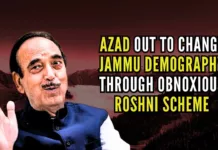
Kashmiri leaders of all hues unhappy with the PM Modi
PM Narendra Modi visited Jammu’s Palli on April 24, National Panchayati Raj Day. He addressed a sea of humanity and spoke for about thirty minutes. It was an altogether different type of speech. He didn’t refer to Pakistan, the epicenter of terrorism, and expansionist China. Nor did he talk about the evils of terrorism and jihad in Kashmir or the prevailing security situation in J&K. He also didn’t think it politically prudent to utter a word on the Kashmiri political class, which did all under the sun for 75 years to make Kashmiri Muslims believe that they were a race apart and, hence, they deserved a sovereign or at least semi-sovereign status or a dispensation outside the Indian constitutional framework accountable to none and widen the gulf between Kashmiri Muslims and the rest of the countrymen.
Likewise, he didn’t say a word about the nature of the problem the bleeding nation has been facing in Kashmir for ages. Nor did he say a word on the woeful tales of the suffering, discriminated against and marginalized people of Jammu province. He also thought it prudent to not reflect on the plight of Hindu refugees from Kashmir languishing in refugee camps in Jammu and elsewhere for thirty-two years.
But more than that, he didn’t say a word on the demand in Kashmir for the restoration of full state status for the UT of J&K as well as the demand in Kashmir for holding elections to the Assembly. Not just this, he for the first time in years didn’t use the term “Kashmiriyat”. Instead, he praised the Dogras and chanted “mithi aye Dogrein di bolee te khand mithe log Dogrey”. This must-have rattled the Kashmiri leadership.
The fact of the matter is that PM Modi didn’t really talk politics, notwithstanding a passing reference to the reform scheme which his government introduced in J&K on August 5-6, 2019: Abrogation of obnoxious Articles 35A and 370 and bifurcation of J&K into two Union Territories of J&K and Ladakh. He focused primarily on distance, connectivity, roads, highways, expressways, power projects, solar energy, natural farming, investment, tourism, and employment opportunities. That he only talked about development and democracy at the grassroots level or panchayati raj and refrained from making any political speech was perhaps a part of a well-thought-out strategy.
It’s obvious that Kashmiri leaders of all hues are extremely unhappy with the PM. The Congress leaders have dismissed his Jammu visit as “politics of false propaganda”. The Abdullahs, the Muftis, the Tarigamis, the Lones, the Mirs, and ilk in Kashmir too have made highly critical statements on the PM’s Jammu visit. They have accused the PM of depriving the people of J&K of their democratic rights and again demanded that what the Modi government “snatched on August 5, 2019, must be returned to them” (read absolute and unbridled legislative, executive and financial powers).
Significantly, the conspicuous absence in his speech of any reference to elections in J&K and restoration of statehood didn’t go well with many leading English language national dailies. At least four dailies – The Hindu, The Hindustan Times, The Indian Express, and The Times of India, April 25 – have editorially expressed unhappiness over the PM’s silence as far as elections in J&K and restoration of statehood were concerned. They have said that the PM’s Jammu visit and what he said in Jammu was not enough and that his government must hold elections in J&K so that the “mainstream Kashmiri leadership” was conciliated and the people of J&K got a government of their own choice. The upshot of all the four editorials was: “Assembly elections in J&K and eventual restoration of statehood are vital to ensure residents have a say in their own development” and that “New Delhi must engage in substantive outreach in the form of gestures that reverse the hostility towards the political representatives in the Valley” (in this case the pro-autonomy Abdullahs and Tarigamis, the pro-self-rule Muftis and the votaries nationhood Lones). It’s obvious that these dailies are blissfully ignorant about the ground situation in the terrorist-infested Kashmir and parts of Jammu province and that they have no place for Jammu in their scheme of things.
Indeed, the PM did exceedingly well to not talk about elections in J&K and restoration of statehood. His government knows it full well that the elections in J&K would at once mean retransfer of the state power to subversive Kashmiri leadership. How could his government even think of holding elections in J&K and retransferring power to those in Kashmir, who are squarely responsible for all the troubles and evils in Kashmir and for the woes of the people of Jammu province? How could his government retransfer the state power to those in Kashmir who rid Kashmir of all Hindus, all Dogras, and almost all Punjabis in 1990, settled illegal aliens, including Rohingyas and Bangladeshis, at strategic locations in and around Jammu city, and changed Jammu’s demography to further their ulterior agenda? How could the Modi Government retransfer the state power to those in Kashmir who converted Jammu province into a Kashmir’s colony and reduced the people of this province to the status of slaves or subjects entitled to no rights?
However, to say all is not to suggest that the Modi Government should deny the people of Jammu province their democratic right to elect a government of their own choice. Why should the nationalistic people of Jammu province suffer for the follies of the Kashmiri leadership? Why should they remain under the President’s rule for an indefinite period? They never committed any sin against the Indian state; they never ever opposed the state’s accession to India; they have been fighting for the national cause religiously since 1947 and suffering just because they love India and hate terrorism, jihad, and divisive politics as being played in Kashmir by the Kashmiri leaders of all hues. They must be allowed to exercise all their natural rights, including the right to elect a government of their own choice. This could be done only if the Modi Government is prepared to separate Jammu province from Kashmir and grant it full state status. As far as Kashmir is concerned, it has to remain under the President’s rule for at least twenty to twenty-five years. This is the general view of the country. Suggested earlier and suggesting again that Kashmir has to be converted into Chandigarh-type Union Territory. This is imperative.
It’s hoped that the Narendra Modi Government would separate Jammu from Kashmir, grant Jammu the statehood status, and hold elections in the State of Jammu given the fact that the nation needs a very strong state in this sensitive border area. Strong Jammu alone could help New Delhi defeat the enemies in this region. Even otherwise, Jammu needs to be separated from Kashmir given the fact that the people of Jammu province are conspicuous by their absence in Kashmir for decades.
Post Script: In the meantime, Pakistan has objected to the PM Modi’s visit and the laying of foundation stones for the construction of the Rattle and Kwar hydroelectric projects which, it claimed, was a “direct contravention” of the 1960 Indus Water Treaty. Its Foreign Office (FO) doesn’t know what it says. PM Modi visited Jammu, the Pakistani FO said: PM Modi visited Kashmir. The mighty Chenab River is in Jammu; the Pakistani FO said: The Chenab River is in Kashmir. The Rattle and Kwar hydroelectric projects are on the Chenab River; the Pakistani FO said: These are in Kashmir Valley[1].
Note:
1. Text in Blue points to additional data on the topic.
2. The views expressed here are those of the author and do not necessarily represent or reflect the views of PGurus.
Reference:
[1] Pakistan objects to PM Narendra Modi’s visit to Kashmir – Apr 25, 2022, The Tribune
PGurus is now on Telegram. Click here to join our channel and stay updated with all the latest news and views
For all the latest updates, download PGurus App.
- ‘Kashmir My core constituency’: Revisiting July 12, 2003 to understand politics, Omar Abdullah-style - March 15, 2024
- Total deviation from traditional approach: Seven takeaways from PM Modi’s March 7 Srinagar visit - March 9, 2024
- Status of political parties: Why is further J&K reorganization imperative? - March 1, 2024











If Jammu gets statehood, that will be a game changer. Hope your predictions come true!